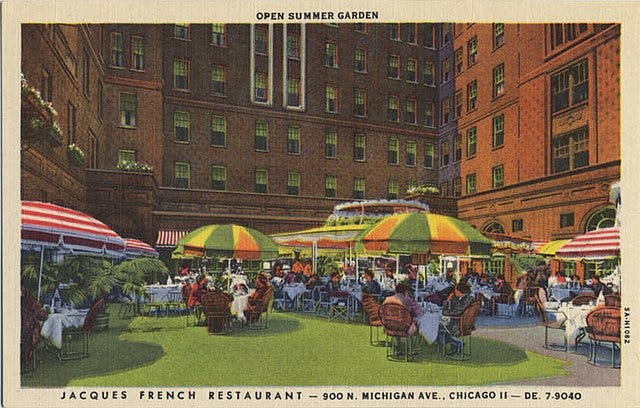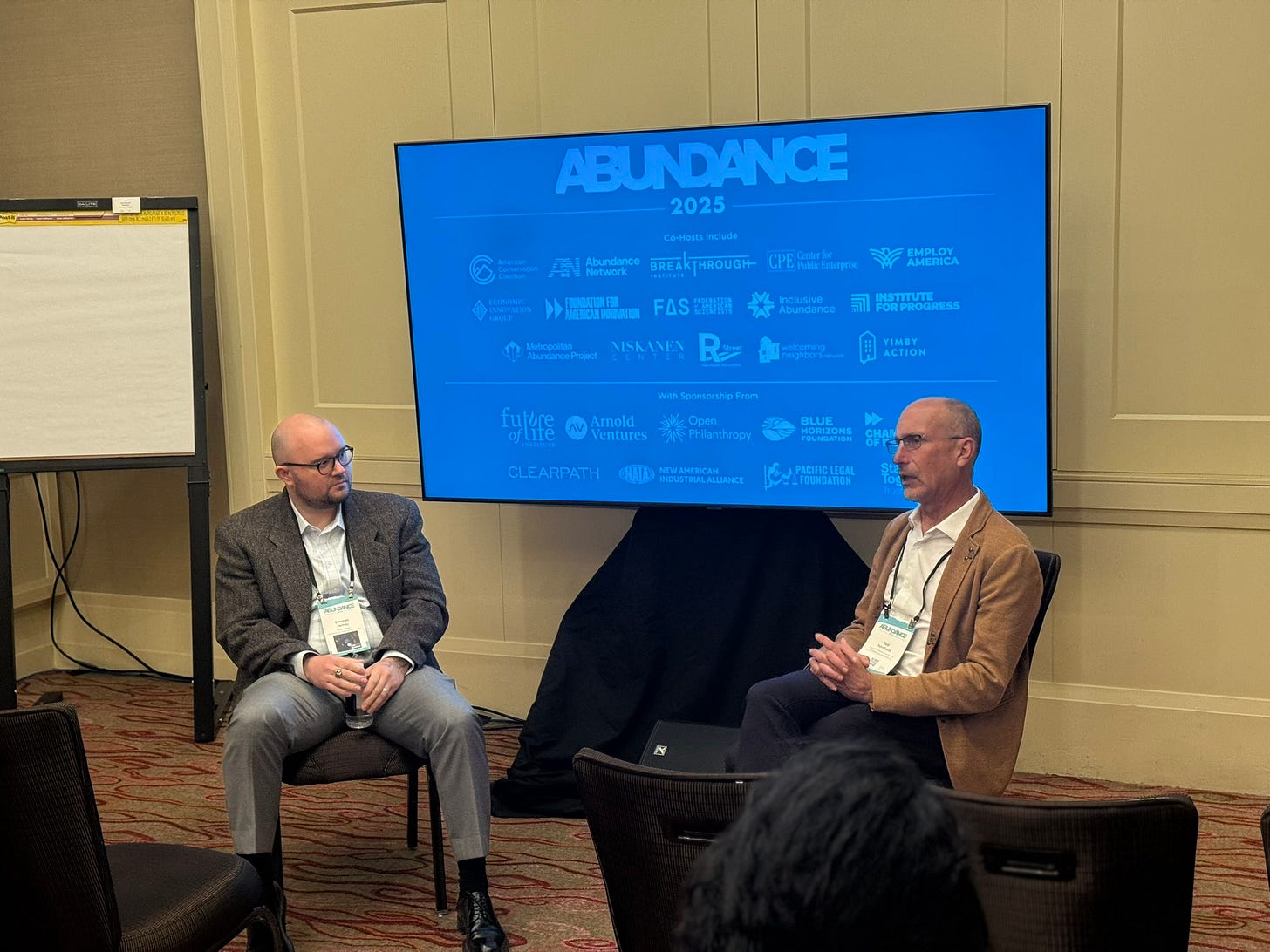Aboondance
Brief Reflections on the Abundance Conference

Last week, I spent a couple days in the Salamander Hotel with over 600 energy, technology, and permitting reform enthusiasts for the Abundance Conference. The goal of this conference is to forge, per its mission statement, “a cross-partisan coalition committed to accelerating economic growth, reinforcing American leadership in science and technology, dismantling bureaucratic inertia, restoring effective governance, and reducing the cost of living.”
Depending on who you are, that sounds either like a good time or a Dantesque pitstop in the white collar necrosphere of Washington, DC.
What can I say? Your mileage may vary, but I had a blast.
I don’t need to tell you that politics feels contentious. Practical issues often fall by the wayside to salacious clickbait. The Abundance Conference, meanwhile, focused on kitchen table issues: energy prices, economic growth, housing costs, etc. And it boasted lawmakers from either side making concessions and talking compromise — at least rhetorically. This felt refreshing. Bipartisanship is a necessary ingredient in energy policy because without it, changes tend to lack durability. And without policy consistency, capital stays skittish and locked up.
And yet, despite all the grand gestures across the aisle, I couldn’t help but notice a few things.
I. What We Talk About When We Talk About Permitting Reform
Everyone wants to talk permitting reform because environmental law has made it prohibitive to build in this country. Conservatives have been rightfully griping about this for decades, and liberals, shocked at the contradictions within their own coalition, have finally started to internalize this problem. That’s good.
The natural area for overlap here concerns pipelines and transmission lines. In multiple conversations, I said I’d be fine with making it easier to build long transmission lines if, in exchange, we enabled natural gas pipelines to the same degree. After all, it costs twice as much to pay for the litigation involved in building a pipeline than building the pipeline itself.
Many of my colleagues across the aisle agreed that this made sense. But often (though not always!), as the conversations went on, it became clear that while I was discussing permitting reform, the person with whom I was speaking was not. Instead, they were describing a different trade: subsidizing transmission lines in exchange for alleviating the green tape around pipeline construction.
To this I say, as I imagine almost every conservative would, “No deal.” It’s apples to oranges. Moreover, wind and solar have been so subsidized that it’s hard for me to take seriously the argument that we must also subsidize the infrastructure that makes them viable.
My policy misgivings aside, I observed that the shift from permitting reform proper to transmission socialization went unnoticed by some of my conversants. I don’t believe this was intentional or manipulative. The discussions were all in good faith. Rather, this phenomena emerged as an artifact of differing political priors, thus revealing what makes compromise so difficult. So often in politics we talk past each other without realizing it. The permitting conversation is but a characteristic example of a frequent occurrence.
I think there are, if not remedies, then ways to mitigate this dynamic; hence the following points.
II. Location, Location, Location
As I mentioned above, it was nice to hear from policymakers from both parties. I felt that Abundance delivered on bipartisanship. Even more impressive, I met people from state and local governments while I was there. One of the best conversations I had involved a Democratic Colorado county commissioner who explained how she opened up her county to fracking. No doubt regulatory strictures were more burdensome than in Texas, but she had just approved a fracking pad in a blue area! And she was proud of it!
I want an abundance of this. Whenever I speak with companies, it’s not just federal issues on their mind. They’re worried about state and local laws. Having a bumper crop of state and local electeds in the mix (and on panels, on stage, etc.) is necessary for actually hashing out how to unleash more growth.
As the Abundance Conference grows, and I suspect it will, it has an incredible opportunity here to actually connect policy positions to policy actions — all this stuff is going to be built somewhere. And it could resolve some of the issues I mentioned above because more conversations would involve key decision-makers, ultimately grounding the conversation in political reality. But that’s codependent on the next point.
III. Release the Realitymongers
I enjoyed many of the panels I attended. It’s provocative to hear about the trade-offs between technocratic and lawyerly societies, to listen in as different philanthropic players explicate their modus operandi, or, in my personal case, have a fireside chat with Ted Nordhaus about nuclear large and small. Here’s a photo from our two-man panel:
However, as a think tanker, I sometimes weary of hearing from other think tankers. Don’t get me wrong: I love my job and it’s fun to play with policy ideas and get into the weeds. That’s important.
But if we’re going to talk about abundance, then we need to talk to the people who make it possible; the people whose responsibility it is to deliver molecules and megawatts day in and day out. In short, we need to hear from industry.
It’s hard to have strictly ideological conversation from first principles about energy policy when you’re speaking with someone who’s literally on the hook for keeping industrial modernity running. Having people from the fracking, pipelines, renewable, nuclear, and utility space would promote both a moderating and informing impact on attendees and panelists alike.
And let’s not forget private capital and labor: someone’s gotta finance all this stuff and then someone else has to build and maintain it.
The absence of these perspectives felt very palpable to me. But there’s good news in even that. Abundance had many more attendees than it did just last year. And it’s showing definite signs of scaling up. That means greater opportunity to get more of these voices in the mix. There is no progress without iteration.
One last thing: my think tank, the Foundation for American Innovation, was featured in a profile in Inc. They not only cover our work saving the Loans Program Office, but also this Substack. That’s all to say thank you, reader. I never take your time and attention for granted and remain grateful for both. You can read the profile here.



You mention the need for Labor at the end of this piece. Much of what we need to accomplish is going to be delayed by the lack of skilled labor. We’re losing more tradesman to retirement than we are replacing, so we’re sliding backward. I would suggest for your next conference that you invite Mike Rowe to talk to attendees about the labor needs and shortages of training resource’s. https://mikerowe.com/